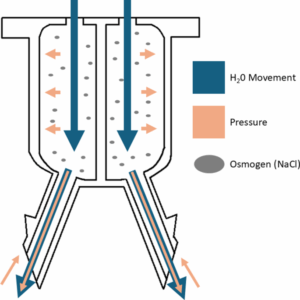
Ata Ullah and Jade Bookwalter et. al recently published “An Osmosis-driven 3D-printed brain implant for drug delivery” in Biomedical Microdevices.
To combat glioblastoma, a highly malignant brain tumor, several different drug-loaded devices have been developed to suppress tumor recurrence. However, these implants have limited effectiveness and often fail due to clogging, reflux, and limitations in intracranial implantation. Therefore, this article outlines the design, fabrication, and results of an osmosis-driven, 3D-printed brain implant. Featuring dual reservoirs, osmotic membranes, and precision-engineered needles, the implant achieves flow rates of 2.5±0.1 µl/Hr and diffusion distance up to 15.5±0.4 mm. A schematic of the working principle of the device is displayed in the figure and the full article can be found at https://doi.org/10.1007/s10544-025-00759-w.
